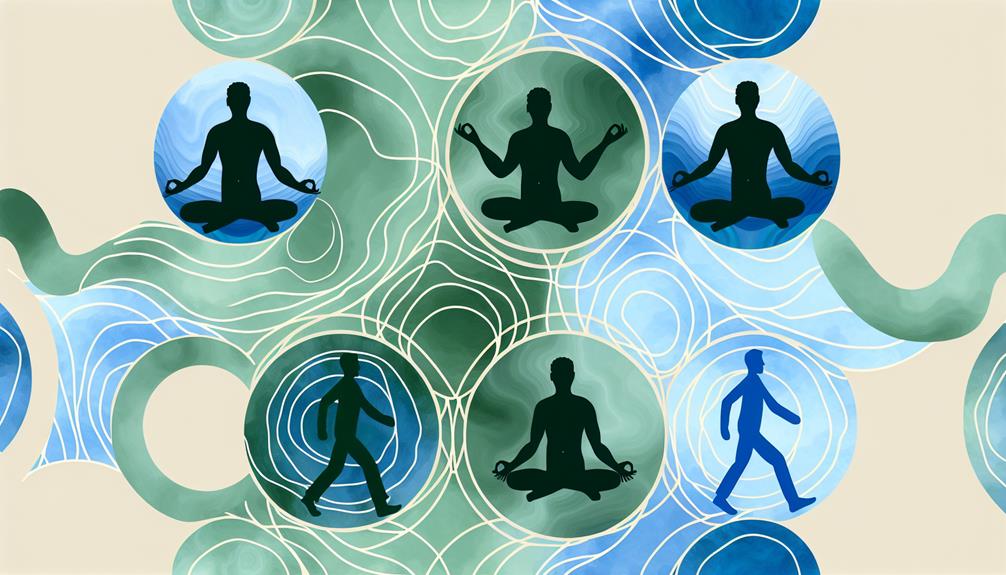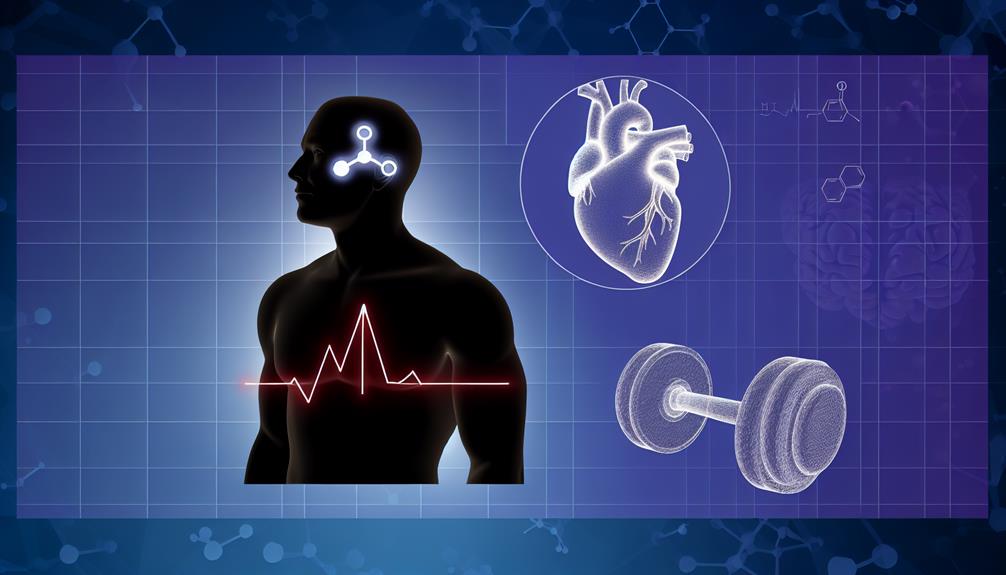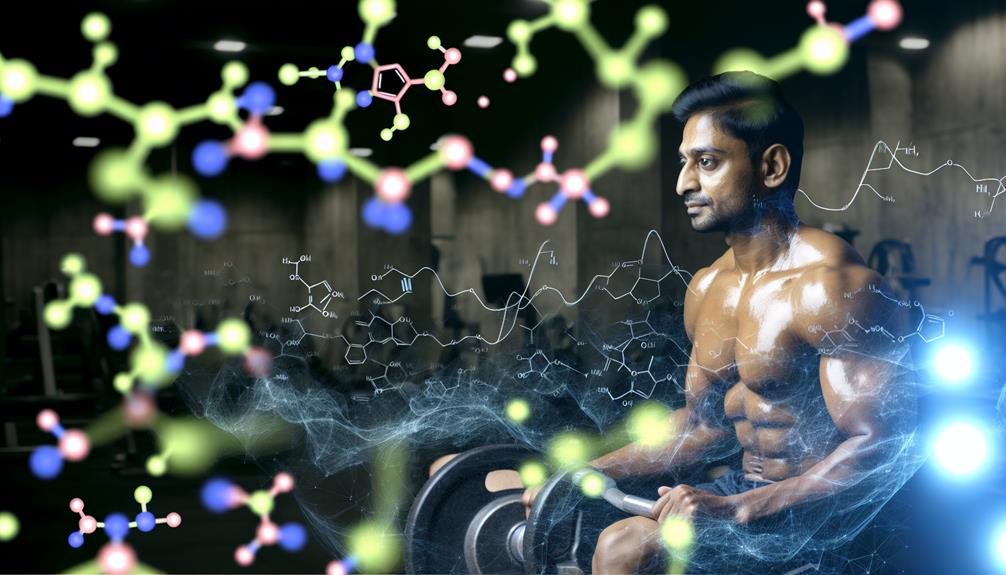As a man, it's essential to understand that hormonal cycles notably impact your health, affecting everything from mood to energy levels. Key hormones like testosterone and cortisol fluctuate throughout the day, influencing your strength, emotional balance, and even libido. I've learned that proper nutrition, consistent exercise, and stress management can help maintain hormonal balance. Recognizing how these hormones change with age is vital for staying healthy. By monitoring your mood and energy patterns, you can make informed choices to support your well-being. There's so much more to explore about optimizing hormonal health that can empower you further.
Understanding Hormonal Cycles

Understanding hormonal cycles can feel overwhelming, but breaking it down makes it more manageable. I've found that grasping the basics of how the endocrine system works helps demystify this complex topic. At its core, hormonal cycles involve a delicate balance of hormones that fluctuate in response to various stimuli, both internal and external.
The endocrine system plays an essential role in regulating these hormonal feedback loops. It consists of glands that produce hormones, each with specific functions that influence everything from mood to metabolism. For instance, testosterone levels can vary throughout the day, affecting energy, focus, and even stress response. Understanding these fluctuations can help you better manage your health.
It's important to recognize that these cycles aren't just a "women's issue." Men also experience hormonal fluctuations, albeit in a different pattern. The rhythmic rise and fall of hormones can impact daily life in ways you might not even realize. Being aware of these cycles can empower you to make informed lifestyle choices, whether it's adjusting exercise routines or managing stress.
When you understand your hormonal cycles, you can take steps to support your endocrine system. Simple changes, like maintaining a balanced diet and getting enough sleep, can positively influence your hormonal feedback mechanisms. Remember, it's all interconnected. By tuning into your body's signals, you can enhance your overall well-being and lead a healthier life.
Key Hormones in Men's Health
Three key hormones play an essential role in men's health: testosterone, cortisol, and estrogen. Understanding these hormones helps us grasp how they affect our overall well-being. Testosterone is often hailed as the primary male hormone. It influences muscle mass, energy levels, and mood. When testosterone levels dip due to stress or age, we might experience fatigue, irritability, or even a decrease in libido. This is where hormonal imbalance can kick in, and it's important to address it for maintaining vitality.
Cortisol, the stress hormone, is another significant player. While it serves a purpose in managing stress and inflammation, chronic high levels can wreak havoc on our endocrine health. Elevated cortisol can lead to weight gain, anxiety, and sleep issues—making it essential to find effective stress management techniques, such as exercise or mindfulness practices.
Lastly, let's not overlook estrogen, which is often thought of as a female hormone. In men, it plays a significant role in bone density and cardiovascular health. An imbalance, where estrogen levels are too high or too low, can lead to various health issues, including mood swings and changes in body composition.
Testosterone Fluctuations Explained

Many guys might not realize that testosterone levels can fluctuate throughout the day and even across different life stages. Understanding these fluctuations can really help us navigate our health better. Generally, testosterone peaks in the morning, making it a great time for workouts or tackling challenging tasks. However, as the day goes on, we tend to experience testosterone dips, which can leave us feeling less energetic or motivated.
Here are three key points to keep in mind about testosterone fluctuations:
- Daily Rhythm: Testosterone levels usually peak between 7 AM and 10 AM. This is why you might feel more vigorous in the morning.
- Age Factor: As we age, our testosterone levels gradually decline. This drop can be noticeable in our 30s and beyond, impacting everything from muscle mass to mood.
- Lifestyle Influences: Stress, diet, and sleep can all influence our testosterone levels. Poor sleep or high-stress environments can lead to lower testosterone dips, while a balanced diet and regular exercise can help maintain healthier levels.
Recognizing these fluctuations isn't just about numbers; it's about understanding how they affect our daily lives. By paying attention to when we feel our best, we can make informed choices that promote our overall well-being. So, let's stay proactive and take charge of our health!
Impact on Mood and Energy
I've noticed that hormonal fluctuations can really affect how I feel day-to-day, impacting both my mood and energy levels. It's fascinating how these changes can lead to mood swings or even heightened stress, making it clear that maintaining hormonal balance is essential. Let's explore how these factors intertwine and influence our overall well-being.
Hormones and Mood Swings
Hormones play an essential role in regulating our mood and energy levels, often leading to noticeable fluctuations that can affect daily life. I've noticed that understanding hormonal triggers helps me navigate these changes more effectively. Here are three key points I've learned about mood regulation:
- Testosterone Levels: Fluctuations in testosterone can lead to irritability or low energy. Recognizing these shifts can help me prepare for days when I might feel off-balance.
- Cortisol and Stress: Elevated cortisol levels during stressful times can cause anxiety or mood swings. Managing stress through exercise or mindfulness has been vital for me to maintain emotional stability.
- Impact of Diet: Certain foods can influence hormone production. I've found that a balanced diet rich in omega-3 fatty acids and whole grains supports a more stable mood.
Energy Levels Fluctuations
Energy fluctuations can be frustrating, often leaving me feeling drained or overly stimulated at different times throughout the day. I've noticed that my energy levels don't stay constant; instead, they seem to ebb and flow. There are moments when I experience energy peaks, making me feel invincible and ready to tackle any task. However, those highs can quickly lead to energy dips, leaving me struggling to focus or even stay awake.
Understanding these patterns has helped me manage my daily activities better. I've learned to schedule demanding tasks during my energy peaks, when my motivation and alertness are at their highest. Conversely, during energy dips, I try to engage in lighter activities or take short breaks to recharge. It's essential to listen to my body and recognize these fluctuations as part of my natural rhythm.
Stress and Hormonal Balance
While managing energy fluctuations, I've also become increasingly aware of how stress plays a significant role in hormonal balance, impacting both mood and energy levels. High stress can spike cortisol, which disrupts our emotional resilience and leaves us feeling drained. To maintain a balanced state, I've found that effective stress management is key. Here are a few coping strategies that work for me:
- Mindfulness Practices: Taking a few moments to focus on my breath helps ground me and reduces stress triggers.
- Relaxation Techniques: Engaging in activities like yoga or meditation not only calms my mind but also aids in cortisol reduction.
- Regular Exercise: Physical activity boosts my mood and energy levels, making it an essential component of my mental health routine.
Hormones and Muscle Mass

I've always been fascinated by how hormones play a vital role in muscle growth, and it's something we can't overlook. Understanding the timing of nutrient intake can really make a difference in maximizing our gains. Let's explore how these factors come together to shape our muscle-building efforts.
Hormones Influence Muscle Growth
Muscle growth isn't just about lifting weights; hormones play an essential role in how our bodies build and repair muscle tissue. Understanding this can help us optimize our training and recovery periods.
Here are three key hormones that influence muscle growth:
- Testosterone: This hormone considerably boosts protein synthesis, enhancing muscle mass and strength. Higher testosterone levels can lead to better performance in the gym.
- Growth Hormone: It aids in muscle recovery and repair, promoting the growth of lean muscle mass. It's vital during those recovery periods after intense workouts.
- Insulin: Often overlooked, insulin helps shuttle nutrients into the muscle cells, ensuring they have the fuel needed for growth and recovery.
Timing Nutrient Intake Matters
Nutrient timing can be a game-changer when it comes to maximizing muscle growth and recovery. I've learned that strategically planning my meal timing around workouts enhances nutrient synergy, helping my body utilize protein and carbohydrates more effectively.
Here's a quick overview of how to optimize your nutrient intake:
| Timing | Nutrients | Benefits |
|---|---|---|
| Pre-Workout | Protein & Carbs | Fuels workouts & muscle repair |
| Post-Workout | Protein | Supports muscle recovery |
| Throughout Day | Balanced Meals | Maintains energy & metabolism |
Eating protein before and after workouts provides the amino acids my muscles need to grow. It's equally important to consume carbs post-exercise to replenish glycogen stores. I've found that spacing my meals throughout the day, focusing on nutrient-dense foods, guarantees I'm not only fueling my workouts but also maintaining consistent energy levels.
Libido and Sexual Health
Understanding the intricate relationship between hormonal cycles and libido can greatly impact your sexual health. I've learned that sexual function isn't just about physical capability; it's deeply intertwined with emotional intimacy and overall well-being. As men, we often overlook how our hormones influence not just our libido but also our relationship dynamics.
Here are three key factors that can enhance libido and improve sexual wellness:
- Hormonal Therapy: If you're experiencing significant changes in libido, consulting a healthcare professional about hormonal therapy could be beneficial. It can help restore balance and support reproductive health.
- Libido Boosters: There are natural libido boosters, such as certain foods and supplements, that can enhance your sexual desire. Incorporating these into your routine might help elevate your mood and energy levels.
- Psychological Factors: Don't underestimate the importance of mental health. Stress, anxiety, and emotional turmoil can negatively affect erectile health and overall libido. Finding ways to manage these psychological factors, such as through mindfulness or therapy, can be transformative.
Age-Related Hormonal Changes

As we journey through life, our bodies undergo various changes, particularly in hormone levels that can greatly impact our health and well-being. One significant phase that many men may experience is andropause, often referred to as male menopause. It typically occurs in middle age and involves a gradual decline in testosterone levels, which can lead to various physical and emotional changes.
Understanding these age-related hormonal changes is vital for maintaining our health. Regular hormonal testing can help identify any imbalances early on, allowing us to take proactive steps. Here's a quick overview of common hormonal changes as we age:
| Age Range | Common Changes | Recommendations |
|---|---|---|
| 30s | Testosterone starts to decline | Consider hormonal testing |
| 40s | More noticeable decline | Monitor mood and libido |
| 50s and beyond | Further hormone level drops | Consult a healthcare provider |
| Varies | Potential symptoms of andropause | Explore lifestyle changes |
Being aware of andropause is essential, as it can affect not just physical health, but emotional well-being too. Symptoms like fatigue, mood swings, and decreased libido can be confusing and overwhelming. By prioritizing awareness and seeking out hormonal testing, we empower ourselves to navigate these changes effectively. Remember, acknowledging these shifts is the first step towards a healthier, more balanced life.
Nutrition's Role in Hormonal Balance
Hormonal changes, especially during andropause, can feel overwhelming, but nutrition plays a significant role in maintaining hormonal balance. I've learned that what we eat directly impacts our hormones, so focusing on the right dietary sources can make a difference in how we feel.
Firstly, I've found that paying attention to nutrient timing is vital. Eating meals at consistent times helps regulate hormone production. For example, having balanced meals throughout the day keeps blood sugar levels stable, which is essential for testosterone levels.
Secondly, incorporating healthy fats into my diet has been a game changer. Foods like avocados, nuts, and olive oil are not only delicious but also provide the necessary building blocks for hormone production. Omega-3 fatty acids, found in fish, are particularly beneficial.
Lastly, I've realized the importance of adequate protein intake. Lean meats, legumes, and dairy products are excellent dietary sources that support muscle health and hormone regulation. Making sure I get enough protein helps maintain my energy levels and keeps my metabolism in check.
To sum it up, focusing on nutrition can greatly influence hormonal balance. Here's what I recommend:
- Prioritize nutrient timing to regulate hormone production.
- Include healthy fats in your meals for hormone synthesis.
- Make certain adequate protein intake for energy and metabolism.
Lifestyle Factors Affecting Hormones

Lifestyle plays an essential role in how our hormones function and can greatly impact our overall well-being. One significant factor is diet. I've come to realize that the foods we consume have profound dietary impacts on hormone levels. For instance, a diet high in processed sugars and unhealthy fats can lead to hormonal imbalances, while whole foods rich in nutrients can support hormone health. Incorporating plenty of fruits, vegetables, healthy fats, and lean proteins has made a noticeable difference in how I feel.
Another critical aspect is sleep quality. I've learned that insufficient or poor-quality sleep disrupts our hormonal rhythms, affecting everything from cortisol to testosterone levels. When I prioritize restful sleep, I notice significant improvements in my mood, energy, and overall health. It's not just about the number of hours I sleep, but also the quality. Establishing a calming nighttime routine and limiting screen time before bed has really helped.
Physical activity is also a piece of the puzzle. Regular exercise can enhance hormone balance, reducing stress and improving mood. I've found that even moderate activity, like walking or yoga, can have a positive effect.
Ultimately, becoming more aware of how my lifestyle choices affect my hormones has empowered me to make better decisions. By focusing on diet, sleep quality, and exercise, I can foster a healthier hormonal environment, which is essential for overall well-being.
Practical Tips for Management
Understanding my own hormonal fluctuations has been a game changer for me, and I think it can be for you too. By making some simple lifestyle adjustments, I've found a more balanced way to manage these changes. Let's explore some practical tips that can help us both navigate this journey more effectively.
Understand Hormonal Fluctuations
While it might be surprising, many men experience hormonal fluctuations that can influence mood, energy levels, and overall well-being. Understanding these hormonal interactions is vital for maintaining balance in our lives. Cycle awareness isn't just for women; it's important for us too.
Here are a few practical tips to help manage these fluctuations:
- Track Your Mood and Energy: Keeping a journal can help you identify patterns in your mood and energy levels. This awareness allows you to anticipate changes and prepare for them.
- Prioritize Sleep: Quality sleep is essential for hormonal balance. Aim for 7-9 hours each night, establishing a consistent sleep schedule to improve your overall well-being.
- Stay Active: Regular exercise can help regulate hormones and boost your mood. Find an activity you enjoy—whether it's weightlifting, running, or even walking—and make it a part of your routine.
Lifestyle Adjustments for Balance
To maintain hormonal balance, making a few key lifestyle adjustments can be incredibly beneficial. First, I've found that improving my sleep quality is essential. A consistent sleep routine helps regulate hormones effectively. Exercise frequency also plays a significant role; regular physical activity can boost mood and energy levels while helping to manage stress.
Speaking of stress management, I prioritize mindfulness practices like meditation or deep-breathing exercises. These not only improve my mental state but also positively impact my hormones. Paying attention to dietary choices is another vital factor; I focus on a balanced diet rich in whole foods while being mindful of hydration levels to support overall health.
Building strong social connections has proven beneficial too, as positive relationships can alleviate stress and enhance well-being. Additionally, I consider supplementation options for nutrients that might be lacking, but I always consult a healthcare professional first.
Lastly, I've learned that environmental factors, such as minimizing exposure to toxins, can also affect hormonal balance. By embracing routine consistency across these areas, I feel empowered to manage my hormonal health effectively.
Frequently Asked Questions
How Do Hormonal Cycles Affect Men's Mental Health?
I've noticed that hormonal cycles can greatly impact men's mental health. Testosterone fluctuations throughout the month can influence mood regulation, sometimes leading to feelings of irritability or sadness. It's essential to be aware of these changes, as they're a natural part of life. Understanding this can help us manage our emotions better and seek support when needed. By paying attention to these patterns, we can improve our overall well-being and mental health.
Can Stress Influence Men's Hormonal Fluctuations?
Absolutely, stress can greatly influence men's hormonal fluctuations. When I experience stress, my cortisol levels rise, which can disrupt other hormones and affect mood, energy, and even libido. Managing stress is vital for maintaining hormonal balance. I've found that incorporating stress management techniques, like mindfulness or exercise, helps me stabilize my hormones and overall well-being. It's essential to recognize the link between stress and hormonal health for a happier life.
Are There Supplements to Support Hormonal Health?
I've often wondered about supplements for hormonal health, and I've found there are several options. Testosterone boosters can help, but I also discovered that dietary changes, like adding healthy fats, can make a difference. Herbal remedies, such as ashwagandha, have shown promise too. Plus, lifestyle modifications like regular exercise and quality sleep are essential. It's all about finding a balance that works for you and supporting your body's natural rhythms.
What Are the Signs of Hormonal Imbalance in Men?
When life feels like a rollercoaster, it might be your hormones at play. If you're noticing mood swings, unexpected weight gain, or fatigue that lingers like a shadow, it could signal hormonal imbalance. Low testosterone levels might lead to fertility issues, while estrogen dominance can create further concerns. I've learned to pay attention to these signs; they're like whispers, urging us to seek balance and take charge of our health.
How Do Sleep Patterns Impact Men's Hormones?
I've noticed that sleep patterns can really impact men's hormones. Poor sleep hygiene often leads to hormonal imbalance, which can affect everything from mood to energy levels. When I prioritize good sleep, I feel more balanced overall. It's essential to create a calming bedtime routine and stick to regular sleep hours. Trust me, improving your sleep can make a significant difference in how your hormones function and how you feel daily.
